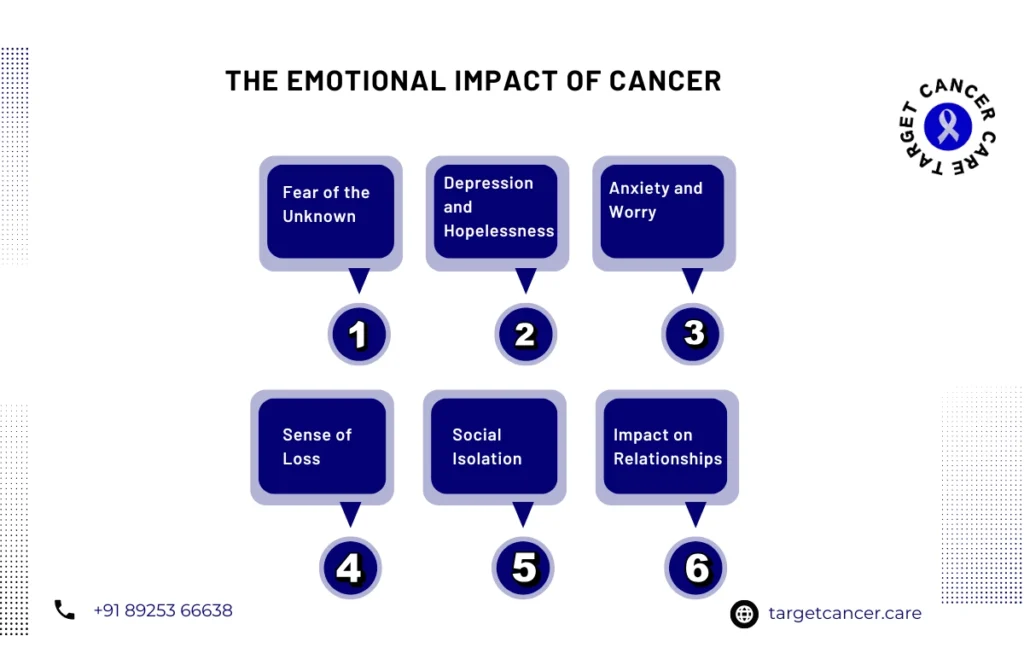A cancer diagnosis affects more than just the body it brings profound emotional challenges as well. For many, the journey includes feelings of anxiety, depression, and isolation, which can complicate the healing process. At Target Cancer Care, we understand that mental health is a crucial part of the cancer journey, and addressing it is essential for comprehensive, compassionate care. By acknowledging the link between cancer and mental health, we strive to support each patient’s complete well-being through every stage of their experience.
Managing cancer is challenging not only physically but also emotionally. The connection between cancer and mental health is profound, as the psychological toll of diagnosis, treatment, and recovery can significantly affect patients and their families. This comprehensive guide explores the intricate relationship between cancer and mental health, focusing on symptoms, outcomes, and ways to improve overall well-being.
The Emotional Impact of Cancer
Cancer affects more than just the body; it profoundly impacts mental and emotional well-being. Patients may experience a wide range of emotions, including fear, anxiety, sadness, and anger. The diagnosis itself can feel overwhelming, leading to significant mental strain.
- Anxiety: Fear of the unknown often leads to persistent worry about the future.
- Depression: Feelings of sadness and hopelessness can arise, making daily life feel overwhelming.
- Social Isolation: The physical and emotional toll of cancer can sometimes create a sense of disconnection from others.
These are natural responses, but they need to be addressed for a balanced recovery. Target Cancer Care is committed to recognizing and managing these challenges alongside medical treatment to support holistic healing.
The Overlapping Struggles of Cancer and Mental Health
Cancer and mental health challenges are often interwoven, making it essential to consider both in patient care. These struggles include:
- Chronic Pain: Pain management can be physically exhausting and can affect mood and mental resilience.
- Treatment Fatigue: Side effects of treatment, like fatigue, can drain mental and physical energy, impacting daily life.
- Fear and Uncertainty: Facing an unpredictable future can increase anxiety, impacting overall well-being.
By addressing these challenges together, Target Cancer Care helps patients manage both their emotional and physical health, improving the quality of life and treatment outcomes.

Mental Health Conditions Common in Cancer Patients
Many individuals with cancer experience mental health challenges, including:
- Anxiety: Frequent worry over treatment and future health.
- Depression: Feelings of hopelessness or disinterest in activities.
- Post-Traumatic Stress Disorder (PTSD): Trauma associated with diagnosis or treatment.
Studies show that approximately one-third of people with cancer may experience these mental health and cancer conditions, which is why mental health and cancer outcomes support is integral to the cancer care approach at Target Cancer Care.
Mental Cancer Symptoms: Understanding the Impact
Cancer not only affects physical health but also significantly impacts mental well-being. Recognizing mental cancer symptoms is crucial for early intervention and improved quality of life during and after treatment. Below are some common symptoms:
1. Anxiety and Fear
- Persistent worry about diagnosis, treatment, or recurrence.
- Feelings of dread that interfere with daily functioning.
2. Depression
- Constant sadness, hopelessness, or a lack of interest in activities.
- Difficulty sleeping or oversleeping, and changes in appetite.
3. Cognitive Impairment
- Often referred to as “chemo brain,” includes memory lapses and trouble concentrating.
- Difficulty making decisions or processing information.
4. Emotional Fatigue
- Feeling emotionally drained or overwhelmed.
- Inability to handle stress as effectively as before.
5. Social Withdrawal
- Avoidance of friends, family, or social activities.
- Feelings of isolation or loneliness.
6. Post-Traumatic Stress
- Re-experiencing cancer-related trauma through intrusive thoughts or nightmares.
- Avoidance of reminders related to cancer diagnosis or treatment.
Managing Mental Cancer Symptoms:
- Seek Professional Help: Consulting a counselor or psychologist can provide coping strategies.
- Join Support Groups: Connect with others facing similar challenges for emotional support.
- Practice Self-Care: Engage in activities that promote relaxation, such as yoga or meditation.
- Talk Openly: Share your feelings with trusted friends or family members.
Addressing these symptoms early can greatly enhance overall well-being and contribute to better mental health and cancer outcomes.
Barriers to Mental Health Care for Cancer Patients
Despite the importance of mental health care, many patients face barriers when trying to access support:
- Stigma: Many fear judgment or misunderstanding if they seek mental health support.
- Financial Challenges: Cancer treatment can be costly, and adding mental health services can feel like an additional burden.
- Lack of Awareness: Some patients may not fully understand how Mental health and cancer outcomes impacts their physical health, delaying their decision to seek support.
At Target Cancer Care, we work to break down these barriers by providing resources, guidance, and support, helping our patients access the care they need without fear or confusion.
The Role of Mental Health Treatment in Cancer Care
Addressing mental health doesn’t just improve emotional resilience; it can also positively impact cancer recovery:
- Stress Reduction: Emotional support can help lower stress, enhancing immune function.
- Improved Adherence to Treatment: Mental health support can help patients stay on track with treatment plans.
- Pain and Symptom Management: Techniques such as mindfulness and relaxation can reduce physical discomfort.
Target Cancer Care believes in caring for both body and mind, which enables patients to face their cancer journey with strength and optimism, improving overall health and quality of life.
Cancer and Mental Health Statistics
Cancer not only affects the body but also has a significant impact on mental health. Many patients experience anxiety, depression, and emotional distress due to the challenges of diagnosis and treatment. Understanding the link between mental health and cancer outcomes is crucial for improving patient well-being.
Key Mental Health Statistics in Cancer Patients
- Depression & Anxiety:
- Up to 25% of cancer patients experience clinical depression.
- Around 35%–40% of cancer patients report significant anxiety.
- Emotional Distress & Quality of Life:
- Nearly 70% of cancer survivors experience emotional distress, affecting daily activities.
- Patients with strong mental health support show better recovery rates.
- Mental Health & Treatment Outcomes:
- Patients with depression have a 39% higher mortality rate compared to those without.
- Good mental health care improves treatment adherence and reduces complications.
The Connection Between Mental Health and Cancer Outcomes
Studies show that addressing mental health and cancer outcomes together can improve overall prognosis. Patients receiving psychological support are more likely to maintain treatment schedules and have better survival rates. Integrating counseling, stress management, and support groups into cancer care can significantly enhance quality of life.
Focusing on both cancer treatment and mental health is essential for holistic healing. If you or a loved one is facing emotional challenges, seeking professional help can make a significant difference.
Practical Ways to Cope with Emotions During Cancer
Here are some effective ways to support mental well-being during cancer:
- Therapy and Counseling: Speaking with a mental health professional can provide coping tools and emotional support.
- Support Groups: Connecting with others who understand can ease feelings of isolation and provide encouragement.
- Mindfulness and Relaxation: Practices like meditation help reduce stress and anxiety, positively affecting mental health.
- Light Physical Activity: Activities such as walking or gentle yoga can improve mood, boosting mental and physical resilience.
Taking these steps can make the emotional journey through cancer more manageable, providing patients with a sense of control and empowerment.
Understanding the Types of Survivorship after cancer
The journey of Survivorship after cancer is influenced by the type and stage of cancer. Certain cancers, when detected early and treated effectively, have a higher rate of survivorship. Common cancers with significant survivorship rates include:
- Breast Cancer: Enhanced screening and treatment options contribute to improved survival rates.
- Prostate Cancer: Early detection plays a critical role in achieving positive outcomes.
- Colorectal Cancer: Advances in screening facilitate early diagnosis and successful treatment.
- Lymphoma: Innovative therapies have greatly improved the life expectancy of survivors.
Despite the commonalities, each survivor faces distinct challenges post-cancer. With appropriate support and resources, they can lead fulfilling lives.
5 Things They Never Tell You About Life After Cancer
While the journey of Survivorship after cancer is often filled with hope, it can also present unexpected challenges. Here are 5 things they never tell you about life after cancer:
- Adjusting to a New Normal : Survivorship after cancer brings significant changes to routines, energy levels, and priorities. Survivors often develop new habits to manage fatigue and adapt to physical or emotional limitations. Balancing past normalcy with new realities requires patience and exploration. Survivorship after cancer is not just about returning to life but learning how to thrive in a changed landscape.
- The Length of Emotional Recovery : While physical recovery from cancer treatment is challenging, emotional healing often takes longer. Survivors may face anxiety, fear, and self-reflection as they adjust. The distinction between being cancer-free vs. cancer survivor can add complexity. For some, “cancer-free” signifies victory, while others relate to the ongoing journey of survivorship. Emotional recovery often involves introspection, counseling, or support from Cancer Survivorship programs, which provide tools to help survivors process emotions and adapt.
- Changes in Relationships : Cancer often alters relationships with friends and family. Loved ones may struggle to fully understand the survivor’s experience, leading to feelings of disconnect. Open communication allows survivors to share their needs and educate others about their journey. Cancer Survivorship programs can address these challenges, helping rebuild stronger, more empathetic connections that support recovery and growth.
- Lingering Physical Effects : The physical effects of cancer treatment, such as fatigue, neuropathy, or scars, may persist, serving as constant reminders of the journey. Survivorship after cancer involves addressing these ongoing challenges through medical care, lifestyle changes, and wellness practices. These lingering effects highlight the distinction between being cancer-free vs. cancer survivor, as some continue to manage long-term symptoms even after treatment ends.
- Redefining What It Means to Be a Survivor : Being a survivor means blending past experiences with a hopeful future. Survivors often reflect on 5 things they never tell you about life after cancer, such as emotional challenges, changing relationships, or fear of recurrence. These experiences shape their identity and priorities. Cancer Survivorship programs offer resources for growth, health, and mental well-being, helping survivors embrace their journey and move forward with strength and resilience.
What Does Cancer-Free Mean?
Being cancer-free signifies that no traces of cancer are detectable through current diagnostic methods. It marks a significant milestone in recovery but requires continuous vigilance and a proactive approach to health. For many, Cancer Survivorship Programs offer support, including dietary guidance, physical therapy, emotional counseling, and regular health check-ups to ensure ongoing well-being.
Embracing a cancer-free life involves integrating holistic health practices to sustain recovery and reduce the risk of recurrence, helping survivors live healthier and more empowered lives.
Cancer-Free vs Cancer Survivor
Understanding the distinction between being cancer-free vs cancer survivor is crucial. Being cancer-free vs cancer survivor indicates that no detectable cancer remains in the body, while Survivorship after cancer includes the entirety of the journey, starting from the initial diagnosis. The term “cancer survivor” embraces anyone who has faced cancer, regardless of whether they are in active treatment, in remission, or fully healed.
- Cancer-Free: Represents a state where no signs of cancer are present post-treatment.
- Cancer Survivor: Encompasses the ongoing journey of mental, emotional, and physical recovery.
Empowerment in Survivorship after cancer reflects the resilience and strength of individuals as they move beyond their treatment experiences. Cancer survivors are not merely defined by their illness but by their continued journey and personal growth.
Is It Remission or Cancer-Free?
The distinction between remission and being cancer-free lies in how the absence of disease is defined:
- Remission: Indicates a significant reduction in the signs and symptoms of cancer.
- Partial Remission: Some cancer remains detectable
- Complete Remission: No detectable signs of cancer, though ongoing monitoring is needed.
- Cancer-Free: Also referred to as No Evidence of Disease (NED), meaning that tests show no detectable cancer. However, this status does not guarantee cancer will not return.
Understanding Cancer-Free vs. Cancer Survivor helps individuals align their recovery journey with appropriate health goals and expectations.
Survivorship Care Plan
A survivorship care plan is essential for individuals who have completed cancer treatment. It provides guidance on follow-up care, lifestyle modifications, and emotional well-being. Understanding the distinction between cancer-free vs cancer survivor is crucial—being cancer-free means no evidence of disease, while a cancer survivor refers to anyone who has had cancer, regardless of their current health status.
Survivorship Care Plan Table
| Category | Details |
|---|---|
| Medical Follow-Up | Regular screenings, blood tests, and imaging to monitor for recurrence. |
| Managing Side Effects | Addressing fatigue, pain, and other long-term effects of treatment. |
| Lifestyle Changes | Adopting a healthy diet, exercise, and avoiding smoking/alcohol. |
| Emotional Support | Counseling, support groups, and stress management techniques. |
| Preventive Care | Vaccinations, routine health check-ups, and risk reduction strategies. |
| Communication with Doctors | Keeping a record of symptoms and concerns for timely medical intervention. |
A well-structured survivorship care plan helps cancer survivors lead healthier, more fulfilling lives post-treatment.
Conclusion
At Target Cancer Care, we understand that cancer and mental health are closely connected, and it’s essential to address both aspects for a truly holistic approach. With the right support, patients can find resilience and hope in the face of their cancer journey. Our commitment to comprehensive care means focusing on both the physical and emotional health of our patients, helping them navigate their journey with confidence and the support they need.




